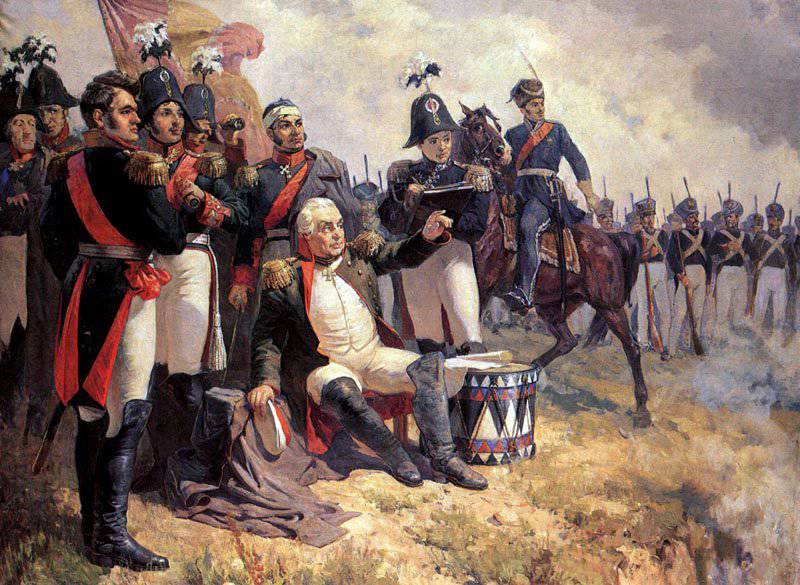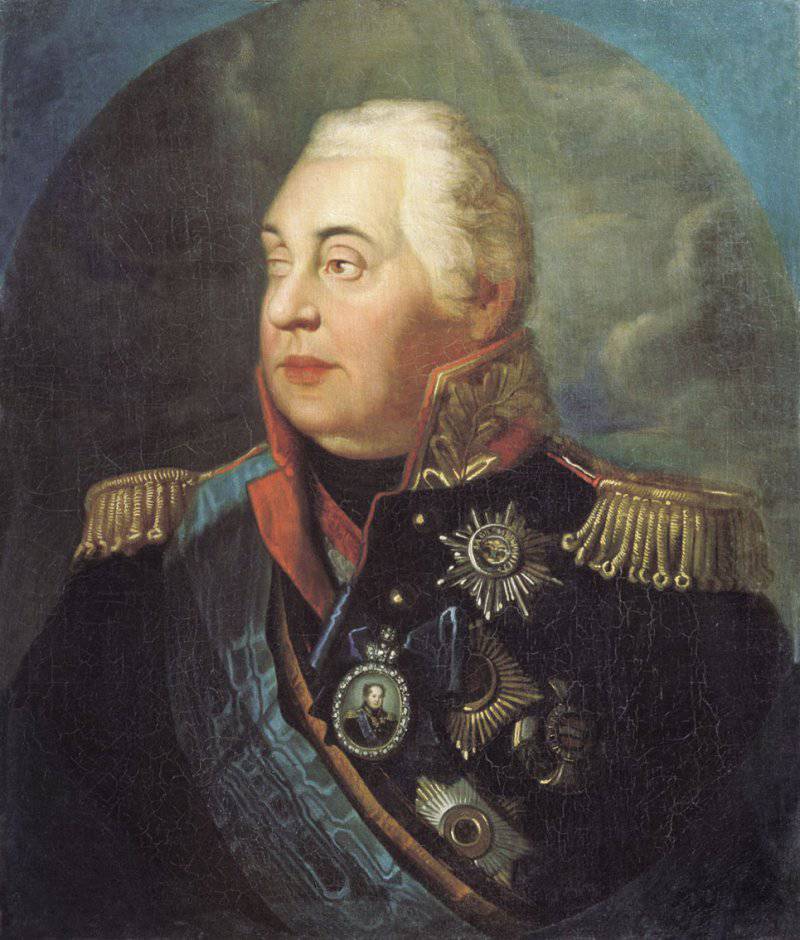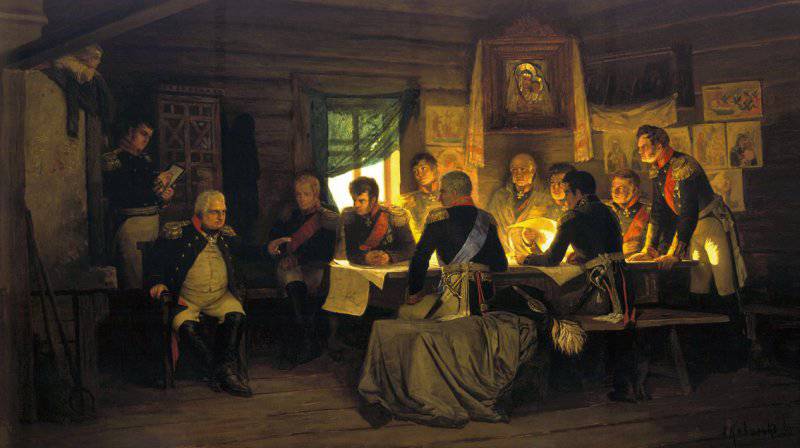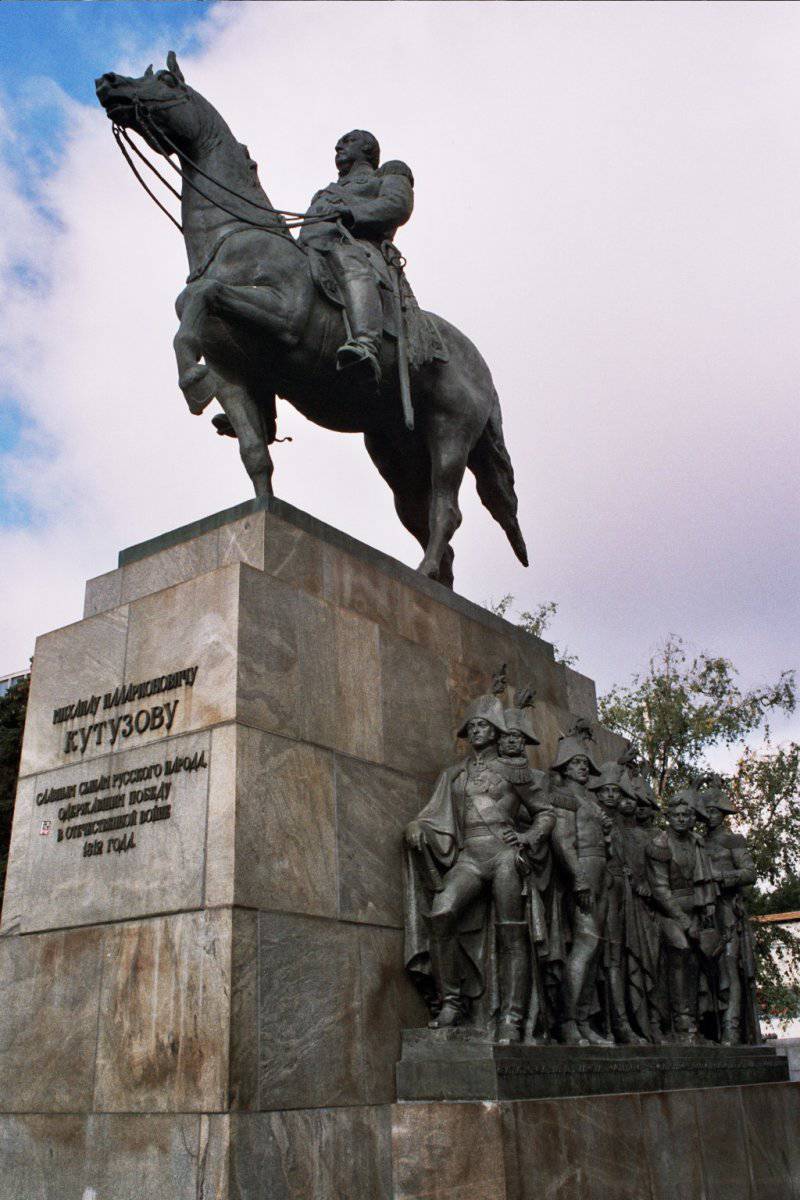Mikhail Illarionovich Golenishchev-Kutuzov
As one of the wise men said, story - This is a mirror that reflects the future. A crooked mirror of the truth will not show. Therefore, let's try to figure out who the famous and mysterious Russian commander really was.
Michael Illarionovich was born in the family of Illarion Matveevich Golenishchev-Kutuzov in 1745 year. Before 14, Mikhail Kutuzov received home education, then he entered the Artillery and Engineering School, where his father taught at that time. In December, 1759, Mikhail Illarionovich receives the rank of conductor of the 1 class (first in his career) with the appointment of salaries and swearing. A little later, assessing the sharp wit and abilities, the young man will entrust the training of officers. Probably, the position of the father - not the last at the Court of Man - also played a role.
Two years later, in February 1761, Michael finishes his studies at school. He was given the title of engineer-ensign, and left at the school to teach mathematics. But the career of a teacher of young Kutuzov is not attracted. Leaving the school, he went to command the company of the Astrakhan regiment, and then temporarily transferred an aide-de-camp of the Prince of Holstein-Beksky. In August, 1762, Mikhail Illarionovich, for the excellent management of the prince's office, received the rank of captain and again sent to command a company of the Astrakhan regiment. Here he met with AV Suvorov, who at that time led the regiment.
In 1764-65, Kutuzov received his first combat experience, fighting with the Polish Confederates. After returning from Poland, Mikhail Illarionovich is attracted to work in the “Commission for drafting a new Code”, apparently, as a secretary-translator. Kutuzov at this point owned 4-mi languages. This document contained the foundations of "enlightened absolutism," a form of government that Catherine II considered the best possible.
Since 1770, Kutuzov, as part of the Rumyantsev Army, has been participating in the Russian-Turkish war of the 1768-1774 years. In this war, the organizational and leadership talents of Mikhail Illarionovich began to unfold rapidly. He showed himself well in the battles of Kagul, Ryaba Tomb, Larga. He was promoted to Prime Minister, and then, in the position of Chief Quartermaster, he received the rank of lieutenant colonel for the difference in the battle at Popeshty in winter 1771.
In 1772, a case occurred that proves the validity of a famous maxim: it is important not only to have wit, but also to be able to avoid its consequences. 25-year-old Kutuzov was transferred to the 2-th Crimean army of Dolgorukov, not just because he had mocked Field Marshal Rumyantsev, not because, with improper intonation, he repeated the characteristics of Prince Potemkin, which the Empress herself gave. “The prince is brave not with his mind, but with his heart,” Ekaterina somehow dropped. Since then, Kutuzov has become extremely careful in the words and the expression of emotions in the presence of even a close circle of acquaintances.
Under the command of Prince Dolgorukov, a young officer, Kutuzov, heads the grenadier battalion and often performs responsible reconnaissance missions. In the summer of 1774, his battalion participated in the defeat of the Turkish troops, who landed in Alushta. The battle took place near the village of Shum, in which Kutuzov received a severe wound to the head. A bullet piercing the temple came out from the right eye. In his report on this battle, General-in-Chief Dolgorukov noted the high combat qualities of the battalion and personal merits of Kutuzov in training soldiers. For this battle, Mikhail Illarionovich received the Order of St.. George 4 degree and was sent for treatment abroad with the award 1000 gold ducats from the Empress.
Kutuzov used two years of treatment to improve his own education while traveling around Europe. At this time he visited Vienna, Berlin, visited England, Holland, Italy, staying in the latter, mastered Italian in a week. In the second year of his journey, Kutuzov headed the Masonic Lodge "To the Three Keys", located in Regenburg. Later he was adopted in the lodges of Vienna, Frankfurt, Berlin, St. Petersburg and Moscow. Conspiracy theorists gave reason to argue that in 1812, Kutuzov did not capture Napoleon precisely because of his Freemasonry.
Upon returning to Russia in 1777, Kutuzov was sent to Novorossia, where he served under the command of Prince G. A. Potemkin. Until 1784, Kutuzov commanded the Lugansk Pickeners, then the Mariupol Light Regiments, and in 1785, he headed the Bug Yeger Corps. The unit guarded the Russian-Turkish border along the Bug River in 1787, and in the summer of the following year, Kutuzov’s corps took part in the siege of the Ochakov fortress. When repelling the attacks of the Turks Michael Illarionovich was again wounded in the head. Surgeon Massot, who treated Kutuzov, released a comment, which can almost be considered almost prophetic: "It must be assumed that fate appoints Kutuzov to something great, for he survived after two wounds fatal according to all the rules of medical science." Despite the severe injury, the future winner of Napoleon has repeatedly distinguished himself in the battles of this war. The strongest and most famous episode was the storming of the fortress of Ishmael, when the 6-I column under the command of Kutuzov successfully broke into the shaft, knocking over the Turks. Suvorov praised the merits of Kutuzov and appointed the latter commander of the fortress. Interestingly, Mikhail Illarionovich received the appointment, having climbed up the fortifications and sent the adjutant Alexander Vasilyevich with the report that he could not hold onto the shaft ... As is known, he could not resist on the shaft, but he settled in very well. In 1791, Kutuzov defeated the 23-thousandth Turkish corps near Babadag. A year later, he strengthened his reputation as a brilliant commander by his actions in the Machinsky battle.
After the conclusion of the Yassky peace, Kutuzov was sent as ambassador extraordinary to Istanbul. In this position, he stayed from 1792 to 1794 for the year, achieving the resolution of a number of contradictions between the Russian Empire and Turkey, which arose after the signing of the treaty in Iasi. In addition, Russia received a number of trade and political benefits, among the latter - a serious weakening of the French influence on Porto.
Returning home, Mikhail Illarionovich inevitably fell into the court "serpentarium", the victims of which were many famous commanders and talented statesmen. However, being a diplomat, no less talented than a commander, Kutuzov gets involved in court fights and leaves them the winner. For example, after returning from Turkey, Mikhail Illarionovich every morning visited Catherine’s favorite Prince P. Zubov, and made him coffee according to a special Turkish recipe, as Kutuzov himself used to say. Such seemingly humiliating behavior undoubtedly played a role in appointing Kutuzov in 1795 to the post of commander-in-chief of troops and garrisons in Finland and, at the same time, director of the Land Cadet Corps. Kutuzov gave considerable forces, strengthening the combat capability of the troops stationed in Finland.
A year later, Catherine II dies and Paul I ascends to the throne, who, to put it mildly, disliked his mother. Many talented generals and closest empresses fell into disgrace, however, Mikhail Illarionovich managed to hold on and even advance through the career ladder. In 1798, he was promoted to Infantry General. In the same year he carried out a diplomatic mission in Berlin, having managed to attract Prussia to the anti-Napoleonic coalition. Under Pavel, Kutuzov stayed until his last day and even dined with the emperor on the day of the murder.
With the accession of Alexander I, Kutuzov still fell out of favor. In 1801, he was appointed by the St. Petersburg military governor and inspector of the Finnish Inspectorate. A year later, he resigned and went to his Volyn estate. But in 1805, at the request of the emperor, Kutuzov led the Russian-Austrian troops in the wars of the Third Coalition.
Napoleon did not wait for a happy meeting of the allies in this war. Having defeated the Austrians near Ulm, he forced Mikhail Illarionovich to withdraw the Russian army from the blow of superior forces. Brilliantly making a maneuver from Braunau to Olmuts, Kutuzov offered to retreat and strike further, having only gained enough strength. Alexander and Franz did not accept the proposals and decided to give a general battle near Austerlitz. Contrary to popular opinion, the plan Veruyter was not so bad and had a chance of success, turn out to be an opponent not Napoleon. Under Austerlitz, Kutuzov did not insist on his opinion and did not retire from office, thereby sharing responsibility for the defeat with the most august tactics. Alexander, and so, Kutuzov, who did not particularly complain, after Austerlitz especially disliked the "old man", believing that the commander-in-chief had deliberately set him up. Moreover, public opinion blamed the emperor for the defeat. Kutuzov is again appointed to secondary posts, but this does not last long.
The prolonged war with the Turks on the threshold of the invasion of Bonaparte created an extremely unfavorable strategic alignment. Napoleon had high hopes for the Turk, and rightly so. 45 thousands of Russian opposed twice the largest army of Ottomans. Nevertheless, Kutuzov managed to defeat the Turks with a series of brilliant operations, and later to incline to peace on very favorable conditions for Russia. Napoleon was indignant - huge funds were spent on the agents and diplomatic missions in the Ottoman Empire, and Kutuzov was able to negotiate with the Turks alone, and even acquire a significant piece of territory for Russia. For the excellent completion of the campaign in 1811, Kutuzov was granted the title of count.
Without exaggeration 1812 year can be called the most difficult in the life of Michael Illarionovich Kutuzov. Having accepted an army full of thirst for battle a few days before Borodin, Kutuzov could not help but understand that Barclay de Tolly’s strategy is correct and advantageous, and any general battle with the genius of tactics Napoleon is an inevitable game of roulette. But at the same time, the non-Russian origin of Barclay caused various rumors, including the accusation of treason, none other than Peter Bagration, in a letter to the Emperor Alexander expressed his indignation, accusing the Minister of War in collusion with Bonaparte. And the rift between the commanders never ended in anything good. What was needed was a figure capable of consolidating both officers and soldiers. Public opinion unanimously pointed to Kutuzov, in which they saw the direct heir to Suvorov’s military successes. Why are only the words abandoned casually and picked up in the army: "Kutuzov came to beat the French" or, as the commander-in-chief said: "How can you retreat with such good fellows ?!" Mikhail Illarionovich, in every way he didn’t let the soldiers lose heart, but already then he probably conceived his most elegant intrigue directed against Napoleon. In any case, many actions of the commander-in-chief from this position acquire quite complete meaning.

Many, including Leo Tolstoy and General A.P. Yermolov focuses on the fact that the Borodino field was not the most convenient position. So, they claim that the position at the Kolotsky monastery was tactically much more profitable. And if we were talking about a general battle, the goal of which is to put an end to the war, then this is indisputably true, but to accept the battle there meant putting the fate of Russia at stake. Choosing the field at Borodino, Kutuzov assessed, above all, the strategic benefits. The terrain here allowed an organized retreat in the event of an unsuccessful development of events, retaining the army. Mikhail Illarionovich preferred a distant but sure result to a quick but dubious success. History has fully confirmed the bid.
Another accusation against Kutuzov is the erroneous disposition of the Borodino battle. In the battle, half the artillery was not used, and the 2-I army of Bagration was given almost to the slaughter. However, this is again a matter of strategy with a large admixture of politics. The Russian army suffered smaller losses, it is likely that Kutuzov would not have been able to push the decision to leave Moscow, which became a trap for the French. A new general battle - a new risk for the army and the whole of Russia. Cynically, but HOW Napoleon Bonaparte said: "Soldiers are numbers that solve political problems." And Kutuzov was forced to solve this problem. Mikhail Illarionovich did not dare to underestimate Bonaparte’s military genius and acted for sure.
As a result, the Great Army in its eyes was turning from an indestructible military machine into a crowd of marauders and tatters. The retreat from Russia turned out to be a disaster for the French and their European allies. A great merit in this belongs to Mikhail Illutriovich Kutuzov, who managed, contrary to public opinion, not to rush into a suicidal battle with the Great Army.
In 1813, in the city of Bunzlau, Field Marshal General and the first full gentleman of the Order of St. George is dead. Circling the troops on horseback, he caught a heavy cold. Buried Kutuzov in the Kazan Cathedral of St. Petersburg.
Mikhail Illarionovich was a brilliant diplomat and a talented commander who knew exactly when to fight, and when not to, and because of this he emerged as the winner of the most difficult situations. At the same time, Kutuzov was indeed a cunning and intriguer (even Suvorov noted these features), with the great difference that his intrigues brought not only self-serving benefits, but also enormous benefits to the entire state. Isn't this the highest indicator of serving the Fatherland, when, despite external and internal barriers, you contribute to its prosperity?



Information